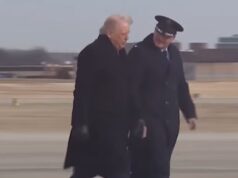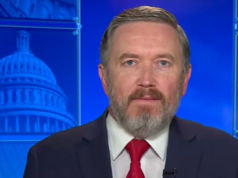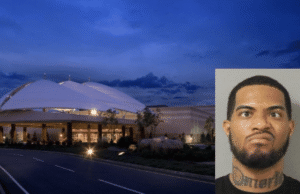President Trump was in vintage form on Saturday, where he first delivered the one-two punch between a Homeric speech, in which he deviated from his prepared remarks and instead chose to amuse the packed room with a series of ad-libbed stories from his first term. Then, just a few hours later, he barnstormed to South Carolina and declared victory in what seemed like just minutes after his arrival and only hours after his highly entertaining peroration in National Harbor.
Although the President continues to deal with the crippling effects of a justice system animated by the same communist ideologies that cannibalized the Soviet Union and so many Socialist banana republics to our south in the decades past, his remarks typified true statesmanship in being at one and the same time reasonable, and marinated in common sense. The President’s hour-and-a-half-long speech not only amused the room but reminded everyone of how special it is to witness a single man so adept in both politics and entertainment – almost like a two-sport athlete, at the top of his game in both leagues.
But the occasion also struck a temperate chord – a warning that, really, not just America but the world’s fate hinges on the outcome of the coming election because President Trump alone seems to be the only leader capable (based on the chaos of the world situation since he departed office) of introducing peace and stability into a global order that has devolved into chaos. Where Trump goes, so goes the world.
The speech also exposed the President’s skills as a master negotiator. Someone who can confidently reassure anxious onlookers, nervous about the ultimate fate of America, that our country’s best days may still be in front of it. But it will require the diligent work of a competent captain to steward this ship out of treacherous waters into more stable currents.
President Trump’s unwavering conviction – in this country and in himself – even in the face of unprecedented political persecution carried out by a vengeful regime that represents itself so pitifully on the world stage with the enfeebled occupant of the Oval Office, is testimony to his unbreakable spirit. More broadly, the President’s endurance reflects the human spirit in general and that hallowed tradition of larger-than-life statesmen that nature somehow produces generation after generation, especially during times of apparently all-consuming darkness, to course-correct just in the nick of time.
What was once CPAC has been dissimulated, by none other than the presidential frontrunner himself, into the elemental ingredients of conservatism, that ideology behind the event’s namesake, which the President summarized in two simple words: common sense.
So many of America’s problems can be resolved by basic common sense, so disarmingly straightforward in theory, but which too frequently succumbs to the distractions and rank incompetence of the present age. The idea that America should have a border to preserve and protect its native-born population would not have been controversial in any other age. Nor the idea that America should invest in its own people and infrastructure and not let the rest of the world – which gets more competitive by the day with the rise of China and India, and even whole continents like Africa and South America – run roughshod over the advantages that once made America stand out by leaps and bounds over the rest.
Nor should the idea that men and women are complementary, albeit naturally different, and no amount of scientific alchemizing will change that. Nor that Americans should have autonomy over their own medical decisions, and least of all have assurances by the state to protect their basic right to privacy. Nor that speaking these basic truths should not be met with the heavy hand of the state, or the legal system, or its apparatchiks in legacy media institutions and Big Tech, which censors dissident voices with scandalous indifference for the foundational principles hardwired by the Founding Fathers in the Constitution and Declaration of Independence to check the size and scope of government, and stave off the blight of tyranny.
In the most general of terms, these were the themes President Trump touched on in his sprawling oration, which are broadly the same themes that define this coming presidential election. The mantra that “they are really after you, I’m just standing in the way” was encapsulated by the gravity of the president’s remarks and the sobriety with which he delivered them – speaking of such things as “Stalinist show trials” that are still ongoing in places like New York, Washington, DC, and Georgia, that are uncannily similar to the recent persecution of Russian opposition leader Alexei Navalny.
The President further talked about how the Biden regime, which repeatedly sells itself as the “defender of democracy,” is really anything but: with its unfailing reliance on patently antidemocratic institutions and mechanisms, such as the justice system and unelected bureaucrats, to expel its chief political opponent from national politics, over and above reliance on the democratic ones – the election process, itself contaminated by those same forces that would completely usurp the will of the people if they had it their way.
The climax of the President’s speech was arguably when he declared himself a “political dissent” – a witheringly poignant line that resonated in a room teeming with political dissidents. The words “President of the United States” adorned the back wall, offering a reminder of the trials this country has endured over the past four years with the fraudulent 2020 election. The illegitimacy of that race unleashed this “long national nightmare” – to invoke a phrase from yesteryear – upon not only the 45th President but his supporters and anyone who dares stand for the traditional values that once made America great.
So too did the presidential backdrop stand as a warning for what is to come, not just the hurdles of the next ten or so months but of all the work needed to stop the bleeding and undo the tremendous damage exacted upon America’s economy, its cultural identity, and its national spirit by the regnant political order.
The President’s indomitable spirit, which is not only contained in his optimistic rhetoric – but on the ground as well through his landslide victories in Iowa, New Hampshire, South Carolina, and, this evening, Michigan – reminds us that the torch of American liberty has not yet gone out – and a national renewal is still possible. This, so long as we keep alive the momentum of this movement, captured in sentiment by President Trump at CPAC: American greatness that lives in the memories of our forefathers who fought generation after generation to preserve the American dream, that last beacon of hope.
Those words are truer than ever, and CPAC was the latest occasion by which the principle that America’s and President Trump’s destiny are inexorably linked was again reaffirmed.









